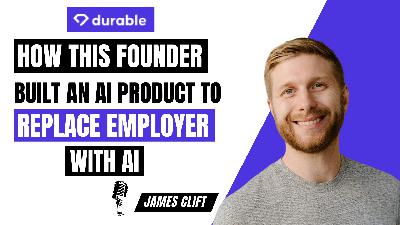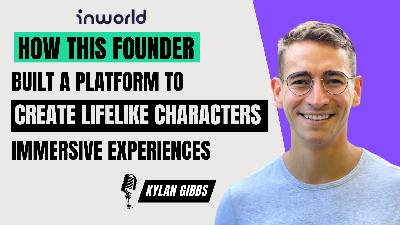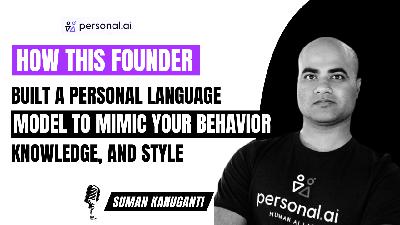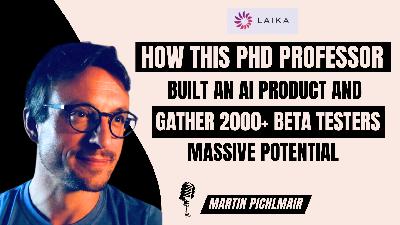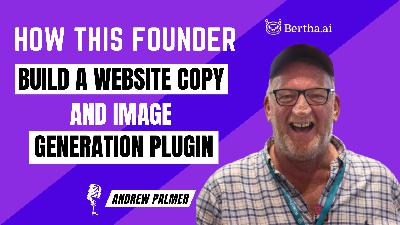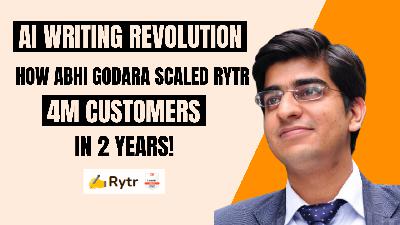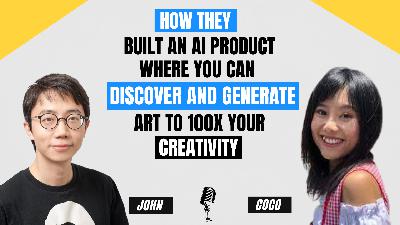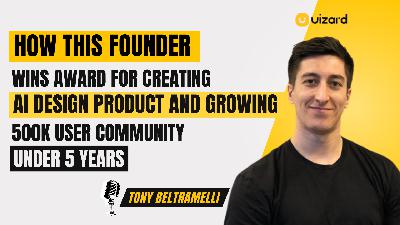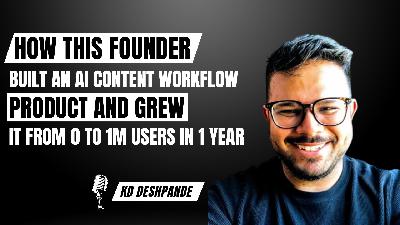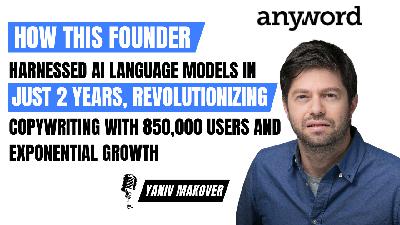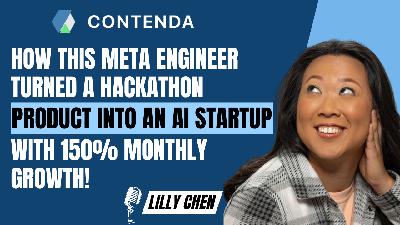This founder built an AI product to replace your employer with AI.
Description
James Clift is the Founder at Durable. He is the former Founder at KarmaHire, WorkStory. VisualCV and Holopod. He building businesses since 2005. In today's episode, We discusses the benefits of large language models (LLMs) like GPT-3, emphasizing their ability to generate human-like text that can be used for a wide range of applications, including content creation for websites. He also emphasizes the significance of having a data-driven approach to fine-tune the models and make them more effective for different business categories. James shares his experience of finding partners with AI expertise, highlighting the importance of networking and being involved in communities like South Park Commons. He believes in sharing work and attracting like-minded individuals to join the venture. Tune in to hear James's insights and experiences in building Durable and how you can apply these lessons to your own business.
Find the full transcript at: https://www.aiproductcreators.com/
Where to find James Clift:
• LinkedIn: https://www.linkedin.com/in/jclift/
Where to find Dhaval:
• LinkedIn: https://www.linkedin.com/in/dhavalbhatt
In this episode, we cover:
00:00:00 - Introduction
00:03:50 - The story behind Durable and its AI-powered website building platform
00:07:22 - The importance of user feedback in AI model training
00:10:49 - Fine-tuning and prompt engineering for LLMs
00:11:22 - Best practices for partnering with technical teams
00:12:27 - Durable's growth, funding, and team size
00:13:20 - Remote work culture at Durable
00:13:49 - Finding AI expertise and attracting technical partners
00:15:16 - The value of sharing your work and attracting like-minded people
00:16:20 - The future vision for Durable
Transcript:-
Dhaval:
This founder built an AI product to replaces your employer with ai. Yes. You heard that right? Your employer, James, is our guest in today's show, he shares his learning on how he built a product in a hyper-competitive market space. James Clift is a founder of durable. Durable, makes owning a business easier than having a job. He's a former founder of KarmaHire WorkStory, VisualCV and Holopod. He has been building businesses since 2005.
Welcome to the call. James, tell us about your product.
James Clift:
Awesome. Yeah, so Durable is the fastest way to build a website on the internet. In three clicks, in 30 seconds, you can generate a business website using ai. And not only can you make a website, we've got the rest of the stack as well to operate a business, we've got a CRM, an invoicing tool a financial account. So essentially everything you need to start and grow your business in just a few click. .
Dhaval:
Wow, that's very powerful vision where do you sit in your market space? are you serving a specific customer segment?
James Clift:
Yeah, so we're totally focused on solo operators, so anyone that runs a solo business. So primarily those are service-based companies, so everything from a web designer, marketing contractor, copywriter to more traditional physical service companies like Lawn care, home Services. Plumbing contractors, skilled trades. So essentially anything where you're trading your hours for dollars or your hours for projects we're a great fit for if you're selling goods on the internet or you have a brick and mortar store, we're not the best solution there, but solo service-based companies is our primary market right now.
Dhaval:
How did you differentiate yourself in this crowded market space? I believe it may be high competition market space. But You have, you seem to have found reasonable amount of success based on what I have seen about you online. How did you create that differentiation for your product?
James Clift:
Yeah, I think there's a lot of ways to look at markets like most markets are very large on the internet, and for us it was a few things. So one is bundling, so providing all the tools you need to run your business under one login. So that was a big value add from the start. So you don't have to learn five different tools. You don't have to pay for five different subscriptions or 10 different subscriptions. It's everything you need under one platform. And then the other piece is what can you actually do 10 times better than everybody else? And for us it's the speed of actually getting a website. Out to market. So instead of taking, typically it's weeks to get a website live, if you're really good it's days. If you're really, really good, it's hours. We actually do that in minutes. So there's this order of magnitude that makes that thing faster, or that business process faster. And it actually unlocks a lot of creativity, a lot of, just makes it more fun and playful, not stressful. And I think you open up these brand new markets by just anytime there's an order of magnitude step change. Something's 10 times faster, 10 times better, 10 times more intelligent. That creates these huge opportunities. And I think AI as a platform is definitely one of them that we're seeing. yeah, I think customers are super excited about the speed, the simplicity, and then the bundling aspect of the platform as well.
Dhaval:
Very interesting. So you brought this up, AI and this particular discussion and discussions like. That I host are focused on people who are either interested in creating an AI product or infusing AI in their existing product. Tell us about your infusion of AI into your product. When did you decide that, was it AI first from the ground up? And if it wasn't, when did you decide to bring AI into the user?
James Clift:
Yeah, I think, so I've ran SaaS companies for a while now, so probably about 15 years. And, it's always, I mean, the goal of any software company is how do you make processes easier and make your products easier to use? So, the long-term vision of us and AI is really, How do we replace your employer with AI and just let you focus on your core competency. So that's your skill, right? So a lot of the time if you have a service job, you have an hourly rate that you're then getting marked up for by your employer. So, in a perfect world, you just meet that reach, that market demand. So, hey, you're a lawyer making, I don't know, call it 500 bucks an hour that your employer charges you out. You're making 200 bucks an hour. So that's a market opportunity for you to go independent and do your own thing. But what the law firm brings to you is a brand customers, some back office services. So the way we're thinking about that is what can we actually replace? And I think brand is changing a lot. Like the brand matters less, the individual matters more, and the back office piece can be solved with technology. So essentially . Everything can be automated except for the thing you're really good at, and that's really how we're thinking about ai. So from a product standpoint, we built the platform first, and then we built the AI on top of the platform because we've got a lot of features and it was always this idea of, how do you make those features easier to use, more accessible, more interesting, and just more intelligent. So the, our customers can just focus on what they're good at. so that's always been part of the strategy. Definitely it's accelerated in the last few months here with all these new technologies and APIs and libraries that have come out, and been super incredible and are moving really quickly. So definitely, the primary part of the strategy moving forward as well.
Dhaval:
One thing, one thing that I always hear from other product creators in the space is about finding the balance between building on top of existing AI capabilities. That other companies have created versus building your own AI capabilities? Where do you draw that line in your product?
James Clift:
Yeah, I think it really depends on what kind of company you want to be. Are you really good at marketing? Can you repackage these libraries and build a good user experiences around them? And you can accelerate really quickly? Are you deep technologists? in that case then you should build the underlying infrastructure layer. For us, I think the advantage, and I think. These core models are really, really powerful, but I think you have to train them on your own data sets. Otherwise you're gonna lose your competitive advantage really quickly. So if you're just re-skinning chatGPT and it's a slightly different user experience, but the same data, That's gonna be a race to the bottom pretty quickly, because everyone can do that. But if you have a user that is unique that you can build data sets around, then you can train these models to be more effective. So we're doing both, we're using the existing models, but we're also training them. Pretty specifically around our category of customers. If you think about a solo business owner, there's a set of activities that you need to do. Even from a marketing standpoint. It's okay, you've got your website. How do you optimize your seo? How do you create your ads? How do you create your marketing copy, your newsletters? Once you have customers in, like, where do you ge

